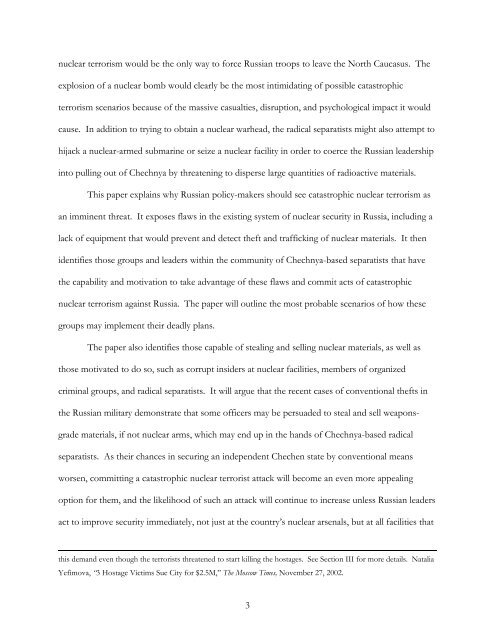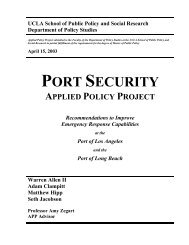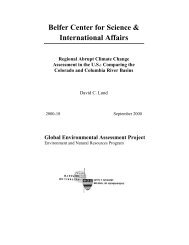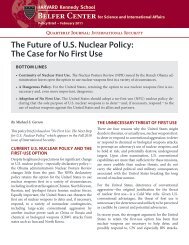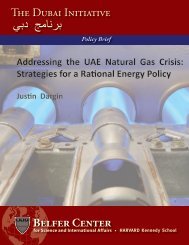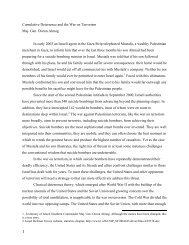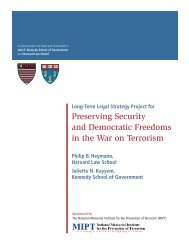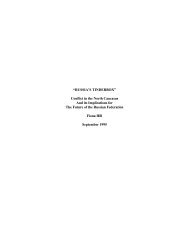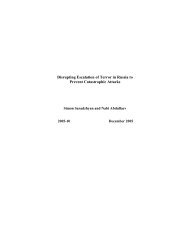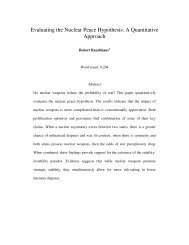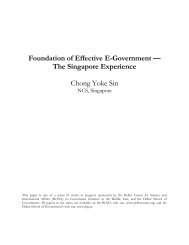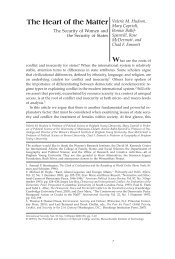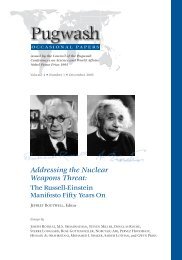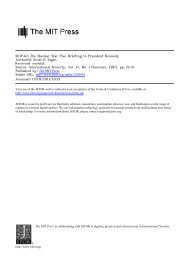Russia - Belfer Center for Science and International Affairs - Harvard ...
Russia - Belfer Center for Science and International Affairs - Harvard ...
Russia - Belfer Center for Science and International Affairs - Harvard ...
Create successful ePaper yourself
Turn your PDF publications into a flip-book with our unique Google optimized e-Paper software.
nuclear terrorism would be the only way to <strong>for</strong>ce <strong>Russia</strong>n troops to leave the North Caucasus. The<br />
explosion of a nuclear bomb would clearly be the most intimidating of possible catastrophic<br />
terrorism scenarios because of the massive casualties, disruption, <strong>and</strong> psychological impact it would<br />
cause. In addition to trying to obtain a nuclear warhead, the radical separatists might also attempt to<br />
hijack a nuclear-armed submarine or seize a nuclear facility in order to coerce the <strong>Russia</strong>n leadership<br />
into pulling out of Chechnya by threatening to disperse large quantities of radioactive materials.<br />
This paper explains why <strong>Russia</strong>n policy-makers should see catastrophic nuclear terrorism as<br />
an imminent threat. It exposes flaws in the existing system of nuclear security in <strong>Russia</strong>, including a<br />
lack of equipment that would prevent <strong>and</strong> detect theft <strong>and</strong> trafficking of nuclear materials. It then<br />
identifies those groups <strong>and</strong> leaders within the community of Chechnya-based separatists that have<br />
the capability <strong>and</strong> motivation to take advantage of these flaws <strong>and</strong> commit acts of catastrophic<br />
nuclear terrorism against <strong>Russia</strong>. The paper will outline the most probable scenarios of how these<br />
groups may implement their deadly plans.<br />
The paper also identifies those capable of stealing <strong>and</strong> selling nuclear materials, as well as<br />
those motivated to do so, such as corrupt insiders at nuclear facilities, members of organized<br />
criminal groups, <strong>and</strong> radical separatists. It will argue that the recent cases of conventional thefts in<br />
the <strong>Russia</strong>n military demonstrate that some officers may be persuaded to steal <strong>and</strong> sell weapons-<br />
grade materials, if not nuclear arms, which may end up in the h<strong>and</strong>s of Chechnya-based radical<br />
separatists. As their chances in securing an independent Chechen state by conventional means<br />
worsen, committing a catastrophic nuclear terrorist attack will become an even more appealing<br />
option <strong>for</strong> them, <strong>and</strong> the likelihood of such an attack will continue to increase unless <strong>Russia</strong>n leaders<br />
act to improve security immediately, not just at the country’s nuclear arsenals, but at all facilities that<br />
this dem<strong>and</strong> even though the terrorists threatened to start killing the hostages. See Section III <strong>for</strong> more details. Natalia<br />
Yefimova, “3 Hostage Victims Sue City <strong>for</strong> $2.5M,” The Moscow Times, November 27, 2002.<br />
3


